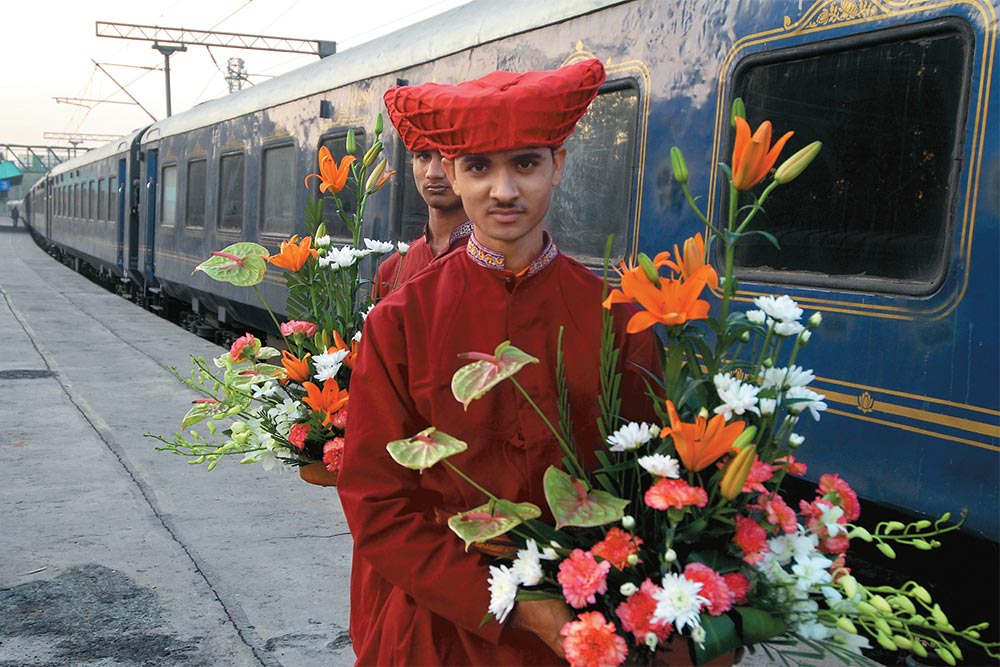Once Kingfisher Airlines got into trouble, no one spared a thought to the quality of service the carrier had gotten us used to. Whether it was the ground crew or, of course, its inflight service, it was leagues ahead of even Jet Airways. Maybe Vijay Mallya was over-reaching himself, but experiential luxury — something we in India hadn’t given much thought to — is now an accepted norm in the way we perceive a product. So, while I admire IndiGo and its staff, don’t forget that it was Kingfisher that made us realise that even cattle class passengers had a right to inflight entertainment, meals you could actually eat instead of gnaw at and great service. As for its business class, I don’t know another airline that wipes your spectacles clean at the end of a flight — a thoughtful gesture as anyone who wears glasses will attest.
The Leela may not offer to wipe your glasses, but you can be sure that someone will be at hand to offer you a tissues for you to do it yourself the moment you step out of your airconditioned car into the humid air of Chennai. The service aboard The Palace on Wheels is also a class apart, quite unlike most railway journeys in India. It is this intangible quality of service that spells what we now call experiential luxury, and which is rapidly growing into one of the great differentiators in the luxe business.
One of the irritants we have grown to live with is security — especially at hotels. We live with it but we don’t have to like it. First the car gets a thorough check at the gate; then you queue up to go through a metal detector where they separate you from your wallet and mobile phone. And even though it is something that must be stoically borne, it can be irksome — so a slovenly, casual approach can earn a growl, while apologetic (but by no means subservient) service wins hands down. At The Oberoi, they remember you, so you don’t have to bother about putting your mobile away in a tray every time; at The Imperial, they’re a step further with technology that does away with the security barricade — and gets my thumbs up.
You would expect every store at DLF Emporio in Delhi to have the same level of service. Sadly, that’s not true. Wear sneakers and a no-name jeans and they’ll freeze you with their icy snobbery. The apartheid treatment is laughable considering the shop assistants don’t take home much more than, say, the price of a wallet, or a tie — so it’s only a reflection of poor manners and even poorer salesmanship. To enumerate the bad examples at many of these branded stores could get me sued, but let it be said: the luxury experience has a long way to go before it can replace awkwardness with genuine warmth. And luxury brands will do well to remember the story of the Rolls-Royce salesman getting his comeuppance when the insulted maharaja of Alwar ordered a fleet of cars — and turned them into garbage trucks. Hardly great publicity for a luxury brand, even if it happened close to a century ago.
Just how seriously some companies take experiential luxury can best be experienced in ITC Hotels’ ‘business of sleep’ — the brainchild of its executive director Nakul Anand. He has been mentoring the chain to create an environment that provides the best sleep you can have away from home. This includes a pillow menu, eye-patches, aroma essences and even a stress relieving foot massage as you kip down for the night.
I’m not sure all of it works, especially the aromas, but I can vouch that their pillows are probably the best in the business. Personally speaking, I find the tucked-in duvet/sheet irritating and uncomfortable — I like sticking my feet out, and if a hotel can give me a loose overlay, I promise I’m most likely to sleep like a baby anyway.











